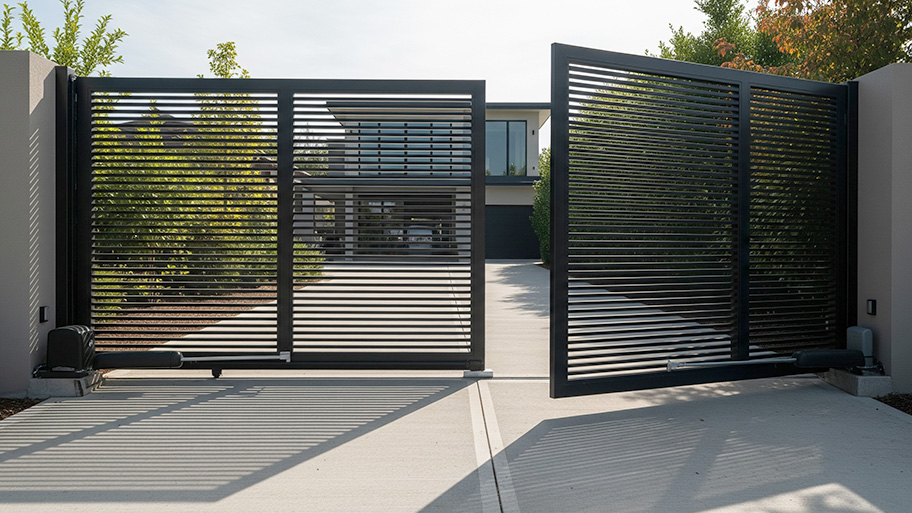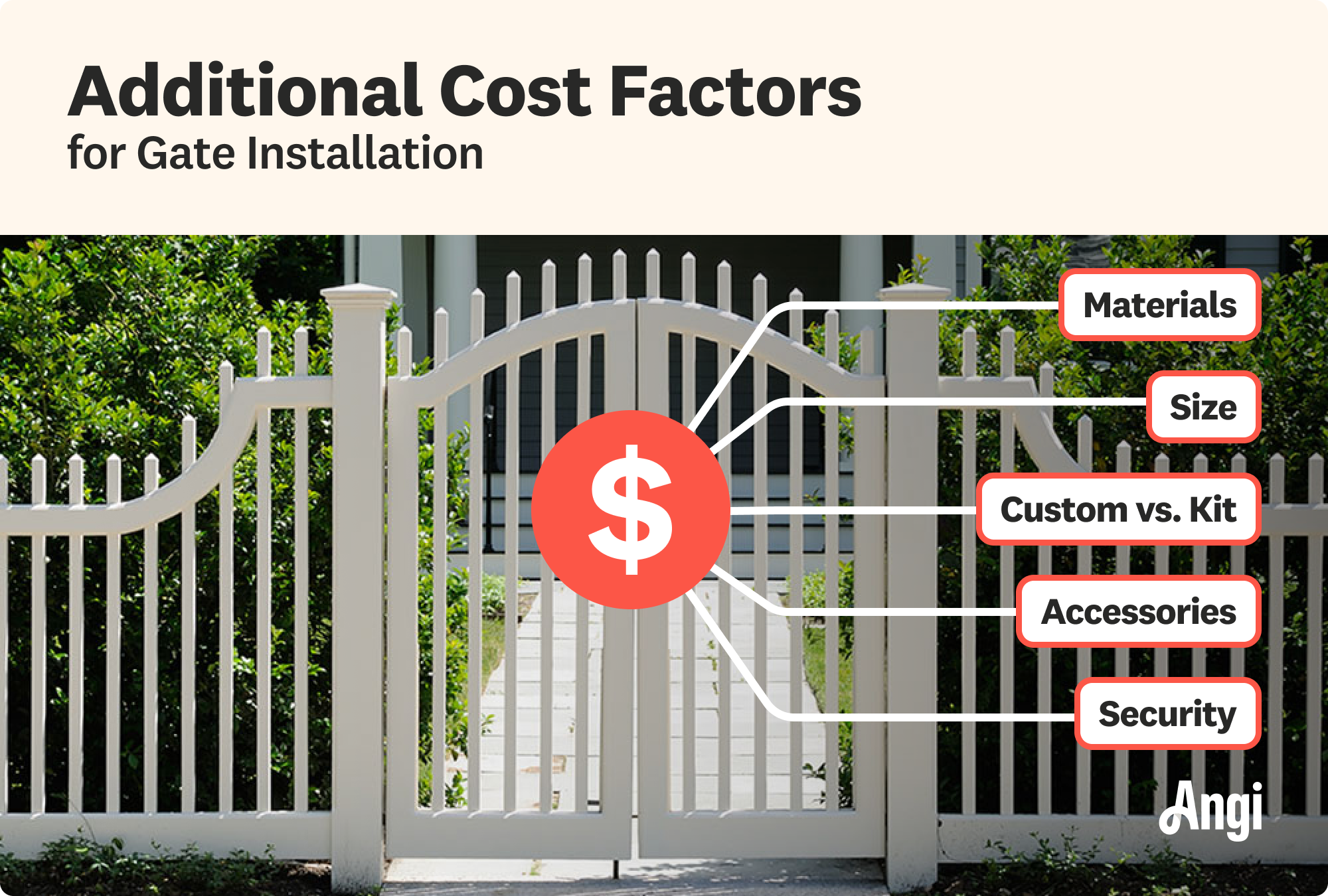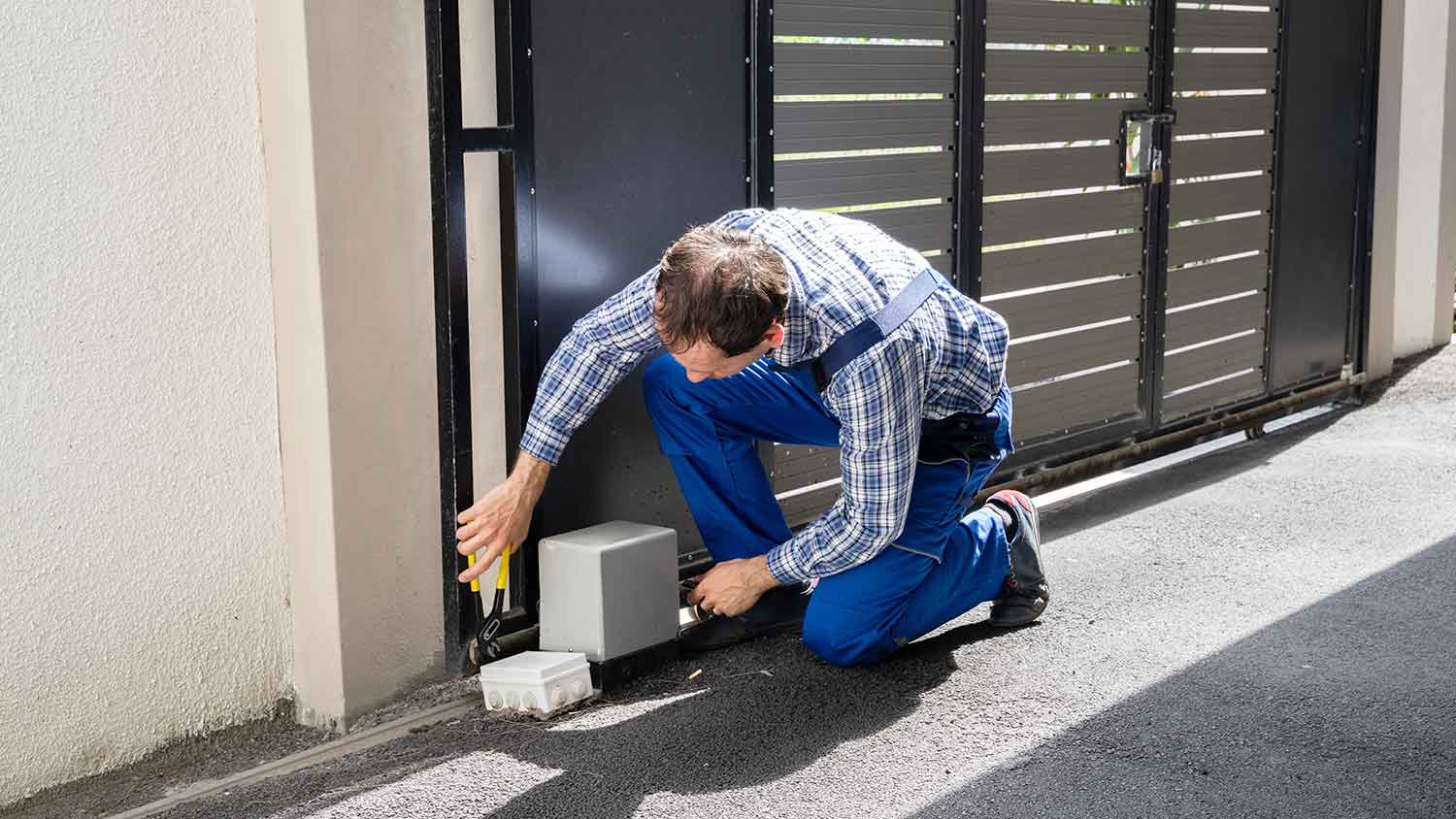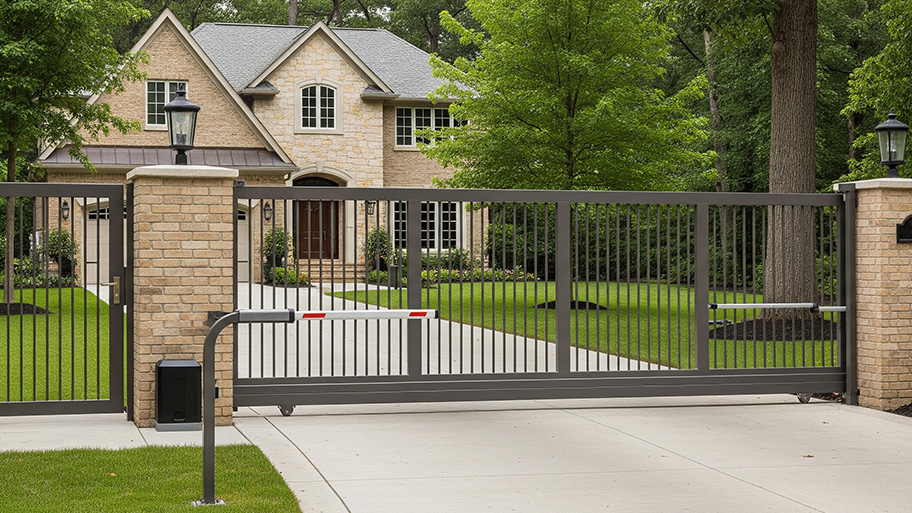
Discover the average automatic gate installation cost, key price factors, and ways to save. Get expert tips for homeowners planning a new automatic gate.
The cost of a security gate averages $2,337, but costs may increase depending on your materials, size, and special features.


Manual driveway gates cost $300 to $1,200, while automatic models range from $1,900 to $6,000, and high-tech security gates can exceed $12,000.
Size plays a major role in pricing, with small 4-foot gates costing $200 to $400 and extra-wide 18-foot gates for vehicles or RVs reaching $6,000.
Labor costs $50 per hour, totaling $200 to $300 for most standard installs, though complex or heavy custom gates may increase labor costs.
Add-ons like automatic openers, keypads, and intercom systems add $1,000 to $6,500.
A gated yard can boost curb appeal, make your space feel more private, and keep kids and pets from wandering off. The average gate installation costs around $2,337, but can range between $879 and $3,823. A top-of-the-line metal gate with high-tech security features can run as high as $7,800, while a simple single-swing fence you install yourself may cost only a couple hundred dollars.
Driveway gates add value and security to your home. To maximize your ROI, consider contacting a pro for this project.

Gate prices vary widely based on the type of gate. You might need an automated sliding gate for a driveway, but a simple, manual gate will suffice for the garden or backyard.
Different types of security gates may cost $3,000 to $12,000 to install because they need to be taller and equipped with security technology, like cameras, keypads, motors for opening, and even intercom systems.
Fences are primarily a means of privacy, but they’re also helpful for homeowners with pets. They are not designed to keep people out. If you’re looking to increase your home’s security, we recommend other methods, such as installing security cameras.
Unless you want to hop out of the car and unlock a manual gate every time you get home from work, you’ll need an automatic gate for the driveway, which will cost about $1,900 to $6,000. For added home security features, the cost for installation will be closer to $12,000.
Manual driveway gates are much less expensive than their automatic counterparts. There aren’t moving parts beyond a few hinges or tracks. Since there are no electronics or complicated mechanisms, manual gates—depending on materials—can cost anywhere from $300 to $1,200.
A single-swing fence made from vinyl or chain-link that you install yourself may cost $200. The cost for fence gates will depend on the material and height, but installation and material costs should be low as almost all walk-in fences are manual. There’s no need for an automatic fence when a simple latch or lock is all you need to open it and access your property.
Privacy fence gates, which cost anywhere from $200 to $12,000, can shield your property from nosy neighbors or passersby. These gates are likely taller, around 6 feet tall or more if your local codes allow it, which increases privacy fence pricing. Keep in mind that some cities or HOAs limit the height of fences, and unfortunately, it can be more expensive to build shorter fences because the materials need to be sized down.
On average, a local fencing contractor charges $50 an hour for fence construction and gate installation. If you’re hiring a contractor to install a single gate, budget for roughly 4 to 6 hours, depending on the complexity of the installation and whether the contractor is picking out the gate for you at a local hardware store.
That means you could spend between $200 and $300 on labor. A contractor may also charge you for the initial consultation and/or removal and disposal of the existing gate.
Here are examples of the average cost of installing a privacy fence gate in various regions of the United States:
| Location | Cost |
|---|---|
| Austin, TX | $200–$600 |
| Boston, MA | $270–$810 |
| Chapel Hill, NC | $200–$600 |
| Chicago, IL | $230–$680 |
| Denver, CO | $215–$650 |
| Detroit, MI | $210–$640 |
| New York, NY | $260–$780 |
| Orlando, FL | $200–$600 |
| Phoenix, AZ | $210–$620 |
| Seattle, WA | $220–$660 |

The cost to install a gate depends on its height and material, but you’ll also need to consider the costs of accessories like gate handles and upgrades, such as motors or keypads.
Vinyl is considered a less expensive gate option, but it’s not as durable as more expensive metal alternatives, like wrought iron or steel. Wood is one of the most popular options for gates and fences.
| Material | Average Cost |
|---|---|
| Wrought Iron | $1,500–$5,000 |
| Wood | $400–$8,500 |
| Chain-link | $200–$1,000 |
| Iron | $600–$8,500 |
| Steel | $600–$8,500 |
| Aluminum | $2,000–$8,500 |
| Vinyl | $200–$1,000 |
Most gate sizes are about 4 to 8 feet, but costs depend on whether you need a small backyard gate or a driveway gate wide enough to accommodate a car, truck, or RV.
| Gate Size | Gate Features | Gate Cost |
|---|---|---|
| 4 feet wide | Ideal for yard or garden | $200–$400 |
| 8 feet wide | Large enough for double-swinging doors | $400–$800 |
| 10 feet wide | Common for driveways | $1,000 |
| 12 feet wide | Also popular for driveways | $1,000–$3,000 |
| 14 feet wide | Good for security | $1,200–$3,600 |
| 16 feet wide | Great for security | $1,500–$4,000 |
| 18 feet wide | Extra-wide, will accommodate RVs, agricultural equipment, or animals | $2,000–$6,000 |
Some gates are available in prepackaged kits for easy DIY installation, costing around $200 to around $2,500. Custom gates will depend on what features you are looking for, but prices will range from around $700 to $12,000.
No gate is complete without the right hinges, locks, handles, and posts. These materials will cost about $100 to $1,500.
If you want a gate with the highest level of security, you can add features like cameras, intercoms, electronic lock keypads, motors, and automatic gate opener installation for an additional $1,000 to $6,500.
While the cost of repairing a fence is significantly lower than the cost of replacing one, you might find that this doesn’t hold true for gates. Replacing a gate with the same kind of gate is a simple swap that most moderately skilled DIYers can tackle; you just need to budget for the cost of a replacement gate. Depending on the type of gate you purchase, the replacement might be about the same amount you’d pay a gate repair contractor to come out and fix your existing gate ($100 to $400).
That said, making minor repairs to an existing gate could be fast, easy, and affordable. It really comes down to what kind of repair the gate needs and whether you’ll need to hire a pro to tackle the job.
Not sure if you should repair or replace your gate? Here are some things to consider:
Will signs of repair show? If you can repair the gate and return it to its former glory in terms of aesthetics, it makes more sense to repair it than replace it. But if it is obvious that you’ve made repairs, that can reduce your fence’s overall curb appeal and deter future potential home buyers from making an offer.
Does it have severe damage? If the gate was damaged during a storm, for instance, it may not be worth the effort to try to salvage it. Sometimes, it’s just as affordable to replace it.
Will security be diminished if you simply repair the gate instead of replacing it? Gates are about accessibility into and out of a secured area. If a repair can’t guarantee the level of security you want to keep strangers out and children and pets in, you should replace it.
Will home insurance cover damage? If your gate has fallen into disrepair just because of wear and tear, you’ll be on your own paying to repair or replace it—in which case you might want to go with whichever route seems more affordable. But if it’s damaged during a storm or some other incident, home insurance may cover fence and gate repair or replacement, and you can defer to your insurance adjustor and the chosen contractor on the best course of action.
Looking for ways to save money on gates? Here are a few helpful tips:
Purchase manual, not automatic: If you’re installing a gate for your driveway, you’ll save a lot of money by opting for a manual one. Over time, you may find it annoying to get in and out of your car to open and close the gate instead of simply pushing a button for an automatic gate, however. It’s just a matter of weighing cost savings vs. convenience.
Install it yourself: Labor makes up a sizable portion of gate installation costs. You might save roughly $200 to $300 by installing the gate yourself. However, your family’s security may depend on the correct installation of that gate; only tackle the install if you’re confident you can do it well. Otherwise, leave it to a pro.
Choose a more affordable material: If you have an existing fence, you’re likely stuck with whatever material the fence is made of to ensure the gate and fence match. But if you’re installing the gate while building a new fence, you have more control over the material. Wood, chain-link, and vinyl fences and gates are among the most affordable.
As far as an appraiser is concerned, a gate won’t increase the value of your home. That said, an old gate that doesn’t work well or doesn’t offer true yard security may be a turnoff to potential buyers.
On the other hand, an attractive, correctly functioning gate may be a selling point for home buyers with children and pets, meaning you could potentially keep your home on the market for fewer days if the gate motivates buyers who specifically need a fenced-in yard or property.
So while it’s not a direct impact on appraised value, there are ways gates and fences can increase the value of your home—through curb appeal and a more attractive listing to potential buyers with specific needs.
Many home improvement stores offer gate kits, so you can install a gate yourself for as little as $200. Keep in mind you’ll also need to purchase gate posts and post filler for $100 to $1,500.
For most gate installation projects, it’s best to hire a local gate installer for $50 per hour, especially if you are dealing with custom gates or heavy materials.
Installing a gate is more complex than it seems. Here’s why it’s best to hire a pro for the job:
Pros ensure proper alignment, stability, and prevent problems like sagging or dragging.
Working with a pro ensures your project meets local building codes and permit requirements.
Experienced pros have the specialized tools and hardware to correctly install components like posts, hinges, and motors.
DIY installation can lead to problems like motor failure, security issues, or misalignment.
Professionally installed gates improve security, boost curb appeal, and can increase your property value.
If you want to help out with the installation, consider assisting your pro with the following tasks:
Clear trees, bushes, and other landscaping from the installation area.
Remove and dispose of the old fencing to prepare the site.
Paint or stain the gate after installation is complete.
Install decor, hardware, or accessories after your pro is done.
Be ready to discuss your gate material, size, and design preferences with your pro.
Have an idea of your desired gate width, height, and length before the project begins.
Ask your pro about potential add-ons, like automation systems, keypads, or decorative hardware.
Let your pro know about any landscaping, structures, or obstacles that could affect the complexity of the installation.
Home is the most important place on earth, which is why Angi has helped more than 150 million homeowners transform their houses into homes they adore. To help homeowners with their next project, Angi provides readers with the most accurate cost data and upholds strict editorial standards. We survey real Angi customers about their project costs to develop the pricing data you see, so you can make the best decisions for you and your home. We pair this data with research from reputable sources, including the U.S. Bureau of Labor Statistics, academic journals, market studies, and interviews with industry experts—all to ensure our prices reflect real-world projects.
Want to help us improve our cost data? Send us a recent project quote to [email protected]. Quotes and personal information will not be shared publicly.
From average costs to expert advice, get all the answers you need to get your job done.

Discover the average automatic gate installation cost, key price factors, and ways to save. Get expert tips for homeowners planning a new automatic gate.

Find out the average automatic gate repair cost, key price factors, and ways to save. Get expert tips to budget for your automatic gate repair.

Automatic gate openers let you open and close your heavy swinging gate with the push of a button. Use this DIY guide for the steps to gate opener installation.

How valuable driveway gates are depends on many factors like size and materials. Read this guide to see if driveway gates do add value to homes.

Curious about the parts of a sliding gate and how they operate? We've gathered everything you need to know if you're considering installing or repairing one.

Hire a professional installer to install your automatic driveway gate for peace of mind and quality installation. Save your time for other things.